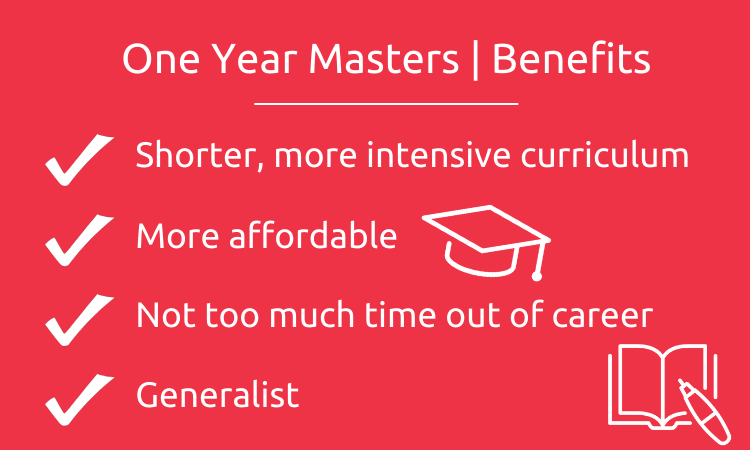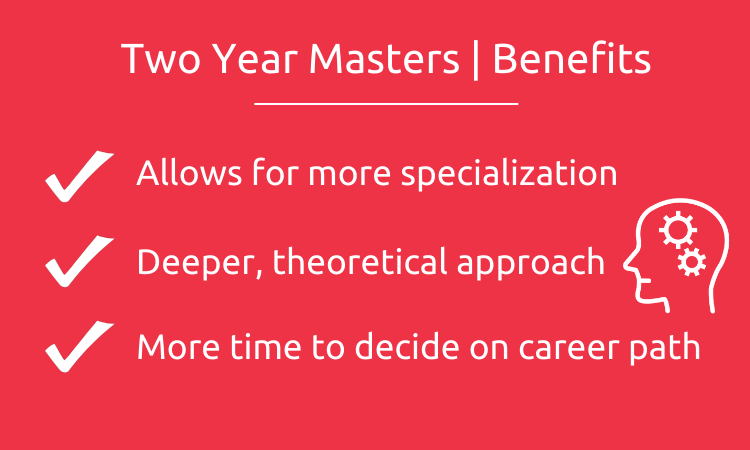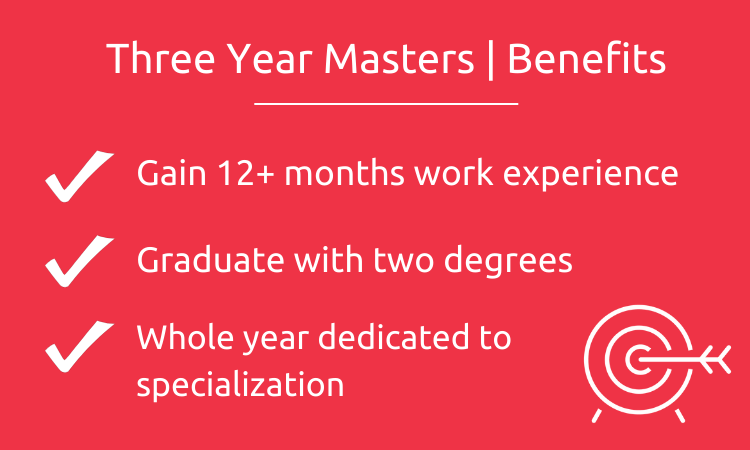Once you’ve graduated from your bachelor’s degree, you may choose to study a master’s degree to further enhance your knowledge, develop new skills, and access greater employment opportunities.
So how long is a master's degree? Business schools offer one year masters programs, two year masters, and even three year programs in some cases.
Deciding what's right for you can be tricky. Here, we look into the benefits of the various different lengths of masters programs, and help you know whether a one year, two year, or three year program is right for you.
One year masters | Why choose
Imagine you’ve graduated and you’ve already got a clear idea of the company or industry where you want to end up. You may even have a deferred job offer, and you’re looking to quickly advance a particular skill set or area of knowledge to prepare you for that job.
If you fall into this category, then one year masters programs are probably right for you. One year degrees cover most of the same core content as longer programs over a shorter more intense curriculum.
This accelerated study program can be advantageous for those looking to quickly get into the world of work and start making some return on their investment (ROI) as soon as possible.
“A graduate from a one year program will be able to seek opportunities faster and benefit from the knowledge gained from their studies,” explains Christos Tsinopoulos, executive dean of the school of business and management at Royal Holloway University. Royal Holloway University offers a range of one year masters programs, including International Business Management, Business Analytics, and AI for Business.

One year programs may also be a good fit for candidates who already have a few years of work experience under their belt. They may already have a clear trajectory, and could be looking for specific qualifications that can accelerate their career. At the same time, these candidates will be reluctant to take too much time out of their careers to go back to school.
An accelerated one-year program, however, doesn’t exclude students who haven't decided on their future careers. One year programs, Christos insists, offer the space and tools for students looking to explore opportunities they may have otherwise not considered.
There's also a strong culture towards networking on a one year program. "Students who study on one year programs tend to be quite focused, and so your fellow classmates can be helpful additions to your professional network," explains Joel McConnell, former executive director of marketing, recruitment and admissions at Imperial College Business School and now senior director of partnership strategy and engagement at edtech firm, Boundless Learning.
Cost is another important consideration. If you’re looking to limit the debt you amass by going to business school, it’s not surprising that only studying for one year will save you a fair bit of money.
In sum: One year masters are ideal for candidates looking for instant career impact, either those with work experience under their belt or clear career goals.
Two year masters | Why choose
If you’re not set on immediately accelerating into the world of work, then a two year masters degree may be a good choice for you. Two year programs have many different benefits compared to one year degrees.
Two year masters are perhaps a more fitting choice for students coming straight from their bachelor's. "A two year master’s degree is ideal for students who need in-depth knowledge in a discipline to compensate for a lack of job experience," explains Shani Elizabeth Pearson, senior recruitment adviser at BI Norwegian Business School.

The longer curriculum lends itself to a theoretical grounding of your studies, somethin that Aalto University School of Business dean, Timo Korkeamäki, believes is important for today's graduates.
“A two year masters program allows development of a stronger link to the science and the theories behind the practical tools,” Timo says.
Beyond that, students can spend their two years going into greater depth in subjects that interest them, or in which they hope to gain a degree of expertise. From artificial intelligence to digital marketing, students can specialize through a greater range of electives modules.
This level of expertise may lead certain students into careers in academia, for which two year masters are a better preparation. Bocconi graduate Marco Giometti used the second year of his master’s to explore research methods and take on extracurricular projects, which teed him up perfectly for his PhD in Finance at The Wharton School in the US.
Due to the length of the degree, it may also give you a chance to pack in additional benefits, such as a work placement or an international exchange. All these contribute to a broader experience at business school.
In sum: Two year masters degrees are ideal for candidates looking to gain greater specialist insight into subjects that interest them
Three year masters | Why choose
Three year masters degrees are certainly rarer to find, but come with a distinct set of benefits.
The three year Grande Ecole Dual Degree format is popular in France, found at schools including EDHEC Business School and HEC Paris. This is a bumper masters offering. In your first year, you’ll take a generalist degree at your host institution (such as a Master in Management). Your second year is a ‘gap year’, allowing you to gain 12 months of work experience through an internship with a top company. Your final year is dedicated to a specialist degree, often at a partner institution in a different country.
There are clear benefits for those entering a master’s without any work experience: you’ll leave with two degrees and at least a year of work experience under your belt.
“The gap year is a unique opportunity to get strong professional experience related to your studies and career goals,” says Carine Belabbas a former Grande Ecole student from EDHEC.

For international students coming to Europe, and hoping to stay there long term, this can be advantageous. It allows you to gain three years on the continent, as well as experience within European working cultures. EDHEC graduate Difei Guo believes this was critical to her landing a job at Amazon after her degree.
“After the gap year, I feel that I proved to myself that I can work in France, and I had a lot more confidence to target bigger companies,” Dife says.
In sum: Three year masters degrees are perfect for candidates looking to generalize and specialize, and pick up some work experience while they’re at it
To help your decision, Carine from EDHEC recommends approaching a school’s admissions team to get a pre-evaluation of your profile, which can tell you what length program may be the best fit.
Furthermore, there’s no right or wrong decision: whether it’s a one year, two year, or three year program you end up choosing, each has their own clear benefits for any candidate.



